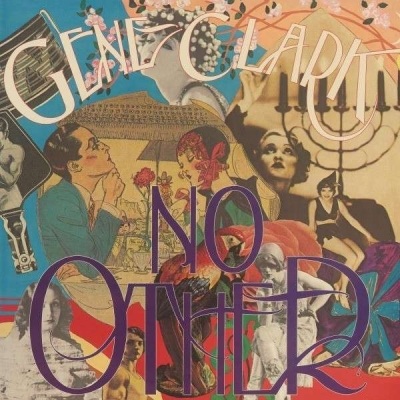
No Other
by Thom Jurek Upon its release in 1974, Gene Clark's No Other was soundly reviled as an exercise in studio and financial excess, a critical and commercial failure -- it was pop music's Heaven's Gate. However, a scant year and a half later, Fleetwood Mac's self-titled album and its successor, Rumours, utilizing similar performance and production techniques, were adored by critics and the record-buying public, and have become cultural mainstays. The appearance of No Other on CD in America some 26 years after its release offers the opportunity to hear this record for what it was: a solidly visionary recording that decided to use every available means to illustrate Gene Clark's razor sharp songwriting that lent itself to open-ended performance and production -- often in the same song (one listen to the title track bears this out in spades). Clark and producer Thomas Jefferson Kaye entered Village Recorders in L.A. assembled a cast of players that included Clark veterans such as Michael Utley and Jesse Ed Davis, Allman Brothers' Butch Trucks, Lee Sklar, Russ Kunkel, Joe Lala, Chris Hillman, Danny "Kooch" Kortchmar, Howard Buzzy Feiten, and Stephen Bruton. Backing vocalists such as Clydie King, Venetta Field, and Shirley Matthews -- who would appear on Bob Dylan's Street Legal two years later -- and including Cindy Bullens, Carlena Williams, Ronnie Barron, Claudia Lennear, and the Eagles' Timothy B. Schmidt, were also in the house. What it adds up to is sprawling, ambitious work that brought elements of country, folk, jazzed-out gospel, blues, and trippy rock to bear on a song cycle that reflects the mid-'70s better than anything from that time, yet sounds hauntingly timely even now. There are no edges on No Other, even in its rockier tracks such as "Strength Of Strings," that echoes Neil Young's "Cowgirl In the Sand," melodically, but its bridge is pure mystic Eastern-harmony, complete with slide guitar wizardry. The shimmering dark textures of "Silver Raven," where Clark's falsetto vocal is kissed by synth and muted basslines, and extended by a chorus that could have come off CSNY's Déjà Vu, is one of the most heartbreakingly blissed-out country folk songs in recorded music history. "From A Silver Phial," as haunting and beautiful as it is, is one of the strangest songs Clark ever wrote, given its anti-drug references (especially considering this is one of the more coked out records to come from L.A. during the era). The final two cuts, "The True One," and "Lady of the North" (co-written with Doug Dillard) are the only two pieces on the disc that mirror back with accuracy where Clark had come from, but even these, as they wind around the listener, are far bigger than mere country rock tunes, and they offer glissando passages of pedal steel and ostinato piano that create narrative movement in the lyrics. This is one of those recordings, one that is being rediscovered for the masterpiece it is. The shortcoming of the CD presentation is that the rest of the session is not here -- it was originally cut as a double-album, but Asylum refused to release it that way. There are versions with alternate takes, but so far only the WEA International version has an additional track. But this is what we have,and as it stands it is a stunning, if completely misunderstood milestone, in Clark's oeuvre.
